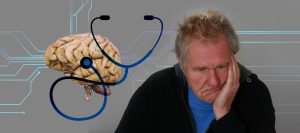
Alzheimer’s is a devastating disease that affects millions of people around the world. It is a progressive brain disorder that gradually destroys memory, thinking skills, and the ability to carry out everyday tasks. Unfortunately, there is no cure for Alzheimer’s disease.
The Alzheimer’s journey is a difficult one for those affected and their loved ones. Watching a friend or family member slowly lose the abilities that made them who they are can be heartbreaking. It can also be a challenge to find ways to provide care and support.
Symptoms of Alzheimer’s Disease
Alzheimer’s is a progressive and degenerative neurological disorder that can cause memory loss, confusion, and changes in behavior.
The early signs and symptoms of Alzheimer’s disease can be subtle and may include:
• Memory Loss: Alzheimer’s can cause a person to forget recently learned information or events, or have difficulty remembering names and familiar places.
• Difficulty Completing Familiar Tasks: People with Alzheimer’s might forget how to do simple tasks they have done many times before, such as making coffee or tying their shoes.
• Language Problems: People with Alzheimer’s may have difficulty finding the right words, or may repeat themselves.
• Disorientation: People with Alzheimer’s may forget where they are or how they got there. They may also get lost in familiar places and have trouble figuring out how to get back.
• Poor Judgment: People with Alzheimer’s may make poor decisions and may have difficulty understanding the consequences of their actions.
• Misplacing Objects: People with Alzheimer’s may put things in strange places, such as putting a wallet in the refrigerator or a watch in the oven.
• Mood or Personality Changes: People with Alzheimer’s may become confused, suspicious, depressed, or fearful.
If you or a loved one is exhibiting any of these signs, it is important to speak to a doctor right away to receive a proper diagnosis and treatment plan. Early diagnosis and treatment can help slow the progression of Alzheimer’s and help people maintain quality of life.
Diagnosis of Alzheimer’s Disease
Unfortunately, there is no single test that can definitively diagnose Alzheimer’s. Rather, diagnosis involves a comprehensive evaluation of medical, neurological, and neuropsychological tests to identify changes in the brain that could indicate Alzheimer’s.
The initial steps in diagnosing Alzheimer’s typically involve a physical exam and medical history review to rule out other potential causes of memory loss, such as a vitamin deficiency or thyroid problem. Lab tests, such as blood tests, may also be conducted to check for anemia, infection, or other medical issues that could be causing the symptoms.
If the results of a physical exam and lab tests are inconclusive, a doctor may order a brain scan to look for structural changes that may indicate Alzheimer’s. Brain scans, such as a magnetic resonance imaging (MRI) or computed tomography (CT) scan, can show changes in the size of certain areas of the brain. The presence of amyloid plaques, which are deposits of a type of protein associated with Alzheimer’s, may also be seen on a brain scan.
The next step in the diagnosis of Alzheimer’s typically involves a cognitive assessment. This type of test is designed to measure memory, problem-solving, and other cognitive abilities that may be impaired in people with the condition. A battery of neuropsychological tests can also provide clues about how well the brain is functioning, and can indicate whether a person is experiencing memory loss associated with Alzheimer’s.
In some cases, a doctor may also refer a patient for additional tests, such as a spinal tap, to measure levels of certain proteins and other substances in the fluid that surrounds the brain and spinal cord. This type of test can provide further evidence for or against a diagnosis of Alzheimer’s.
Ultimately, an accurate diagnosis of Alzheimer’s requires a combination of all of the above tests and a thorough evaluation of the patient’s medical and personal history.

Treating Alzheimer’s
Fortunately, there are treatments that are available to help manage the symptoms and slow the progression of the disease.
The primary treatment for Alzheimer’s disease is medication. The medications used are cholinesterase inhibitors, which are designed to help improve memory and thinking. These drugs may slow the decline of cognitive function in some people, but they do not cure Alzheimer’s.
Other treatments for Alzheimer’s include lifestyle changes. Staying physically active, eating a nutritious diet, and getting enough sleep can help to manage symptoms and improve mental functioning. Being mentally active and engaging in activities that require mental stimulation such as puzzles, reading, and playing word or board games can also be beneficial.
In addition to medication and lifestyle changes, there are also psychosocial therapies available to help people with Alzheimer’s manage the emotional and behavioral symptoms that can accompany the disease. These therapies may include counseling, support groups, and cognitive-behavioral therapy.
Scientists are working hard to find treatments and even a cure for Alzheimer’s. Organizations like the Alzheimer’s Association provide support and resources to those affected and their caregivers. There are also many creative ways to provide care and comfort to someone with Alzheimer’s.
For example, music therapy is a powerful tool that can help stimulate memories and emotions in those affected by Alzheimer’s. Music can provide a sense of peace and joy, even in the darkest of times. It can also provide a way for family members and friends to bond with their loved one.
Scientists are becoming increasingly hopeful that advances in technology and medicine will lead to treatments that are more effective and provide more hope to those living with this devastating condition.
The Alzheimer’s journey can be difficult, but it isn’t impossible. With the proper resources, support, and creativity, caregivers can find ways to provide meaningful and loving care for those affected by Alzheimer’s.